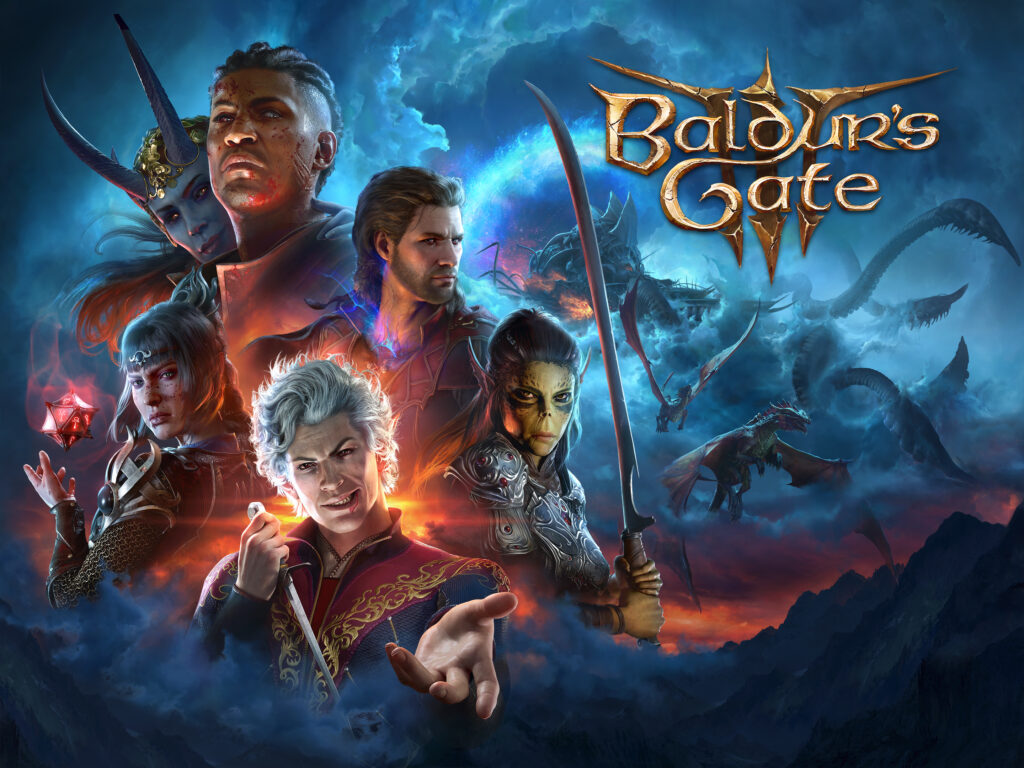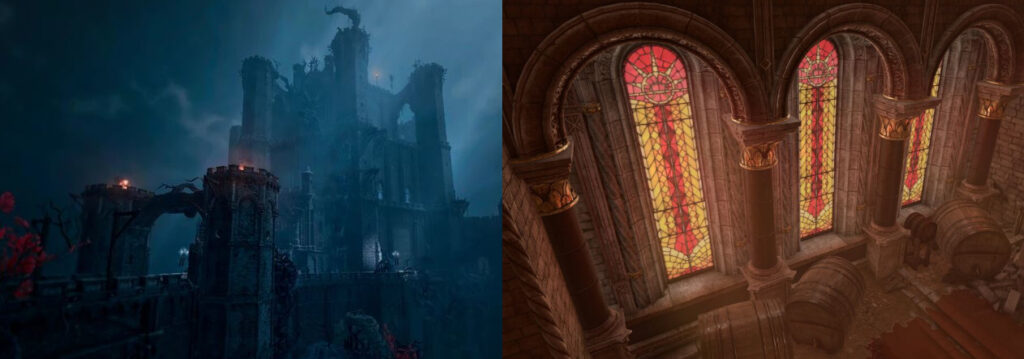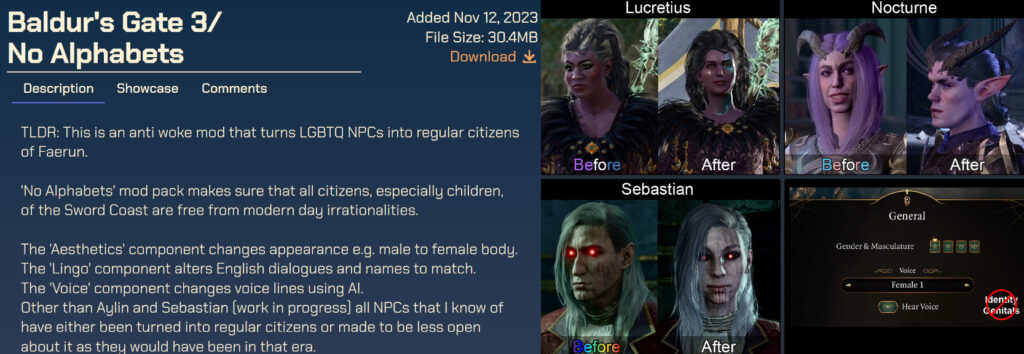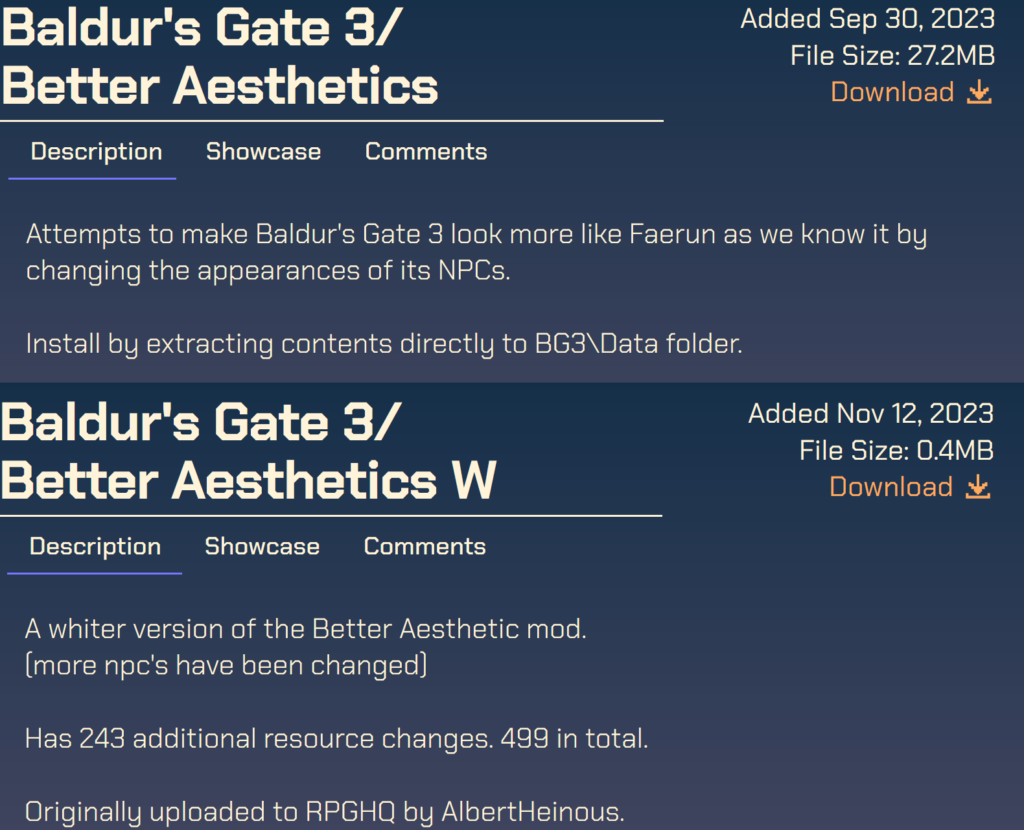Blair Apgar (Elon University)
Video games set in traditional fantasy worlds often draw inspiration from the Middle Age; though still largely divorced from academic conceptualizations of the period, modern titles such as Larian Studio’s Baldurs Gate 3 (2023) have begun to prioritize more holistic interpretations which highlight diversity in ethnicity, languages, gender, and sexuality (albeit transposed for a fantasy setting) throughout the game.

The imagery of Faerûn draws heavily on medieval European visual sources to create and populate the world. Castles and dungeons proliferate, the scenery otherwise defaults to a vague and deliberately imprecise sense of the medieval: stained glass, hewn stone, knights in armor, etc. This tendency towards imprecision, while integral for the integration of traditional fantasy aspects (magic/the supernatural, fantasy races/creatures etc.) has allowed a white, cis-hetero version of the Middle Ages to become the default of medievalist fantasy, in the process constructing a “lore” which is intrinsically tied to this conception.

Even when titles such as Baldur’s Gate deliberately expand these narrow parameters and inch closer to a more historic conception of the Middle Ages, game mods can reimpose these tropes by fundamentally altering elements of the game’s code, changing character models, narratives, and settings to impose a typically Eurocentric and cis-heteronormative vision of the medieval period. Often cited as a defense of existing lore, these mods perpetuate an ahistoric conceptualization of the period, the survival of which reinforces white supremacist mis-readings of history.

A popular but controversial mod ‘No Alphabets’ was released at the end of 2023 which altered any non-heterosexual, non-cisgender character within the game. The mod’s name is likely a play on the phrase ‘Alphabet Mafia’ which is itself a glib reference to the full name commonly used to describe the wider LGBTQIA+ community. The mod was designed, by the creator’s own admission, to “make the gender and sexuality of world NPCs match medieval status quo”—in doing so, it changed character skins, dialogue options, as well as disabling trans-related character creation options in order to bring the game in line with a narrow (mis)conception of the medieval history. The obvious implication is that the Middle Ages which is being referenced throughout the game was exclusively cis-heteronormative in nature.

This trend has informed many of the mods available for the game: the same developer also released a mod to change the skin color of the lone Black origin character Wyll to white, and another popular mod innocuously titled ‘Baldur’s Better Aesthetics’, significantly reduces the number of non-white characters altogether in the name of “respecting the lore.” Trawling through the comments on the sites where these mods are hosted, it’s clear both the creators and consumers of these mods are trying to bring about what they deem a “more accurate” Faerûn, exclusive of non-white and queer folks. These sentiments run deep in the Baldur’s Gate fandom and is part of a larger issue that has been well-documented in medievalist fantasy media.[1]
In white supremacist circles, these mods seek to both reinstate a white Middle Ages, while claiming to respect existing lore—quite tellingly, the creator of the abovementioned mods commented “I’m pro-lore, not racist”. The “Gaming” section on the white supremacist forum Stormfront is replete with references to the “good medieval games”. Asobo Studio’s 2019 A Plague Tale: Innocence is held up as an admirable example by some users, cited for the game’s apparent exclusion of any “SJW” material (racial diversity, sexual/gender diversity).[2] On a running thread from 2021, white supremacists lament the absence of “pro white” games; a common theme throughout are replies which propose modding as a way to subvert developer’s intentions, reshaping the game to fit their shallow understanding of the medieval world. While games like Baldur’s Gate 3 strive for a richer portrayal of the medieval era, mods offer the ability for players who are so inclined to return to antiquated interpretations of medievalist fantasy. These mods push a narrow vision of the medieval world, one that aligns with white supremacist views and erases the complexities of the past. This trend highlights the ongoing struggle to create a more inclusive fantasy experience.
[1] Carpenter, Benjamin J. J. “‘Monstrous Adventurers’: The Racecraft of the Dungeons and Dragons Imaginary.” Howard Journal of Communications 35, no. 1 (2024): 15–32. doi:10.1080/10646175.2023.2238194. Garcia, Antero. “Privilege, Power, and Dungeons & Dragons: How Systems Shape Racial and Gender Identities in Tabletop Role-Playing Games.” Mind, Culture, and Activity 24, no. 3 (2017): 232–46. doi:10.1080/10749039.2017.1293691. Evans, Michael. “‘You Wouldn’t Want to Be Historically Inaccurate’: Online Responses to Race in Medievalist Television.” Chapter. In Studies in Medievalism XXVIII: Medievalism and Discrimination, edited by Karl Fugelso, 13–20. Studies in Medievalism. Boydell & Brewer, 2019. Young, Helen, and Kavita Mudan Finn. Global Medievalism: An Introduction. of Elements in the Global Middle Ages. Cambridge: Cambridge University Press, 2022. Young, Helen. Race and popular fantasy literature: Habits of Whiteness. New York, NY: Routledge, 2018. Young, Helen. “Whitewashing the “Real” Middle Ages in Popular Media” In Whose Middle Ages?: Teachable Moments for an Ill-Used Past edited by Andrew Albin, Mary C. Erler, Thomas O’Donnell, Nicholas L. Paul and Nina Rowe, 233-242. New York, USA: Fordham University Press, 2019. https://doi.org/10.1515/9780823285594-023.
[2] Khosravi, Ryan. “Neo-Nazi Gamers Are Modding Their Favorite Titles to Make Them Explicitly Racist.” Mic, April 12, 2017. https://www.mic.com/articles/173392/neo-nazi-gamers-are-modding-their-favorite-titles-to-make-them-explicitly-racist.

Thanks very much for this Blair – really important and insightful stuff as always. Do we see much in the way of mods which try to take these games in the opposite (and more inclusive) direction? I remember a range of mods around LGBT relationships for Baldur’s Gate II, although I can’t really speak as to their quality.
Thanks for asking Rob, great question! YES there is, thankfully, a fairly robust community of modders who are doing things like genderswaps, and adding in non-white or non-cishet characters. I’ve only played with the mods a wee bit, but their developers are generally very devoted to making these things fit about as flawlessly as possible. Unfortunately, they have also become a bit of an issue with the modders I’m discussing above as they use them to create false equivalencies of (and this is just one example I remember seeing around last year): If you’re OK with making Astarion a woman (one of the more popular genderswap mods), then surely there’s nothing wrong with making Wyll white.
I’ll link a little of the reporting I saw about a really cool mod made by Alanté Carter which made all origin characters Black as a response to the White Wyll mod: https://www.wargamer.com/baldurs-gate-3/companions-mod-black and https://www.themarysue.com/baldurs-gate-3-mod-makes-all-companions-black/. According to Carter, one of the most pervasive criticisms of the mod was that if he wanted a game with Black characters, he should just play one with more Black characters than change existing ones, but as we both know, medieval fantasy games which centre the experience of non-white characters are not exactly prevalent.
Thanks very much for this Blair! As always modders will simultaneously destroy and save any game. Lot’s to think about as always.
Thanks Blair, this is very interesting! I am not sure I have a question as much as a comment – I’ve been looking at games and sexuality in my own historical area recently, and it’s really striking that we see a lot of the same tending towards heteronormativity and lack of diversity in mods and in the games themselves (and fan responses) even though ancient Greece and Rome are really *not* eras that should make that kind of approach to sexuality ‘lore-appropriate’! So the claim to be ‘accurate’ or ‘appropriate’ to a time period seems to be totally divorced from any actual sense of that period (as you say, it’s also a misconception of medieval ideas too, of course!) I suppose I can add a question here, which is do you see much pushback from those who object to these grounds doing so on that historical basis, that it’s not more ‘accurate’ to make these changes, and if so, do they get any kind of response?
(Of course, I don’t know what “accurate to the era of Faerun in the age 1492 DR” is supposed to mean anyway, and why that is supposed to mean = Christian Europe in the ‘medieval’ period, but nevermind, let’s leave that aside for the moment…)
Short answer: Yes, I’ve seen push back to some success. It seems more effective when it comes from someone with authority rather than someone who happens to have more information, but overwhelmingly it is interactions with the latter that I see play out.
To this point, I haven’t seen a ton of engagement between the Authorities (aka us academics) and those who might want to create or use these mods for ‘history’s sake’. This, I think is part of the larger issue of disseminating research to the public issue which plagues all academics. Putting the prejudiced people aside who cannot be swayed, there are surely those who genuinely don’t know anything about the Middle Ages beyond a “I know it when I see it” kind of attitude, and who may think a company is taking too many liberties (which, I completely agree with your point–how can it be accurate if it’s fictional!)
Would this person be more receptive if they spoke with a real, live historian who could, without overwhelming, correct their misconceptions? Maybe for some, probably not for others! In complete honestly, it’s the strongest characteristic of MAMG as it seems to be one of the biggest and most influential platforms which intends to do just that: put us/our expertise/our authority in the orbit of those who might want/need it!
Building on Kate’s point, what do you think is the best approach to confront these issues, on a broader and more systemic level?
It seems to me that even indulging in the “accuracy” argument is playing into these supremacists’ game. The argument that a game with magical squid spaceships and purple-haired devil people is “medieval” (or accurately “historical” in any way) is just as ludicrous as their uninformed views on historical sexuality.
I totally agree with you on using accuracy as a shield–I think my answer probably is not one with which everyone agrees, but I think the developers should be disabling mods which run counter the spirit of the game. While these mods have been kicked from a lot of the big mod-sharing sites like Nexus, that they continue to work with the core game allows them to retain their ‘power’, so to speak. If companies like Larian wanted to maintain the diverse character base it clearly worked so hard to create, I think they have a stake in making sure the mods aren’t cynical attempts to go against that. Of course, this becomes a matter of corporate judgement (an already fraught concept) and opens the potential for banning the “right” and the “wrong” kind of mods, but it seems like a tangible step that these companies could take to not become part of the problem. Or, perhaps the even less popular choice is to simply disable all mods!
Hi Blair – thanks for this paper! I’ve seen this modding in my own work as well (in both BG3 and Dragon Age). When these garner the attention of forums, usually there is a lot of pushback and fighting against them from fans. I’m curious where you think these mods stand in the broader context of a diverse playerbase (particularly for games like these). Do you think these mods and attempts at drawing games away from inclusivity are a last bastion of a player segment that’s slowly fading away or an indication of a larger problem lurking within the gaming community?
I try not to subscribe to the mindset of “They’ll all die out eventually” because it feels like a really passive response to something which doesn’t just happen by osmosis, but directed and concerted action! These folks learn from each other–both the hateful ideologies, but the practical skills necessary for modding. These mods continue to be posted/reposted/discussed on large social forums like Reddit, where they continue to attract new people to the fold. That process seems to wax and wane (and I fear will never completly die off), particularly in relation to how socially acceptable it is to publically endorse and claim these mods (I’m thinking about how we’ve seen the drastic increase in race and gender motivated hate crimes in the US which has come along with the rise of the far right).
Just to give a Brazilian counterpoint to Blair’s answer: lately we’ve been seeing some young, high profile, extremist political figures that claim to be spokepersons for “the gamer culture” (whatever the hell that means).
They are usually influencers who are riding the wave of disinformation and seditious activity that flourished in Discord groups and unregulated social media platforms. But some have been elected to political positions and are now meddling in legislation, pushing for reactionary measures.
The appearance of these self-entitled “gamer activists” have been accompanied by some other disconcerting trends – e.g. white supremacist games released on popular marketplaces and game conventions catering to gun and military enthusiasts (maybe this seems trivial in a US context, but it was never common in Brazil).
So I have to agree with Blair: I don’t think they are dying out.
Wow. As soon as I read the title I said “YEP” and eagerly began reading. It was a better read than I imagined. I remember the discourse surrounding BG3 when it came out and the reaction to the mod. It was grotesque. We need this paper, and I think if there’s one paper in this conference that should go viral it’s this one.
Thanks for writing this.
Thank you for your paper! I am not familiar with the game, but I find the development you described very interesting in that while the picture of “cis gender” predominantly white Middle Ages is anachronistic, the alternative with racial and gender diversity is no less so. In the Middle Ages, “otherness” was based not on race or ethnicity, because these notions were not created yet, but on religious differences. Think of the Saracen Sir Palomides in the Arthurian story of Tristan, or if Parzival’s black& white brother Fierefilz in Wolfram von Eschenbach. They are accepted into the community as soon as they adapt Christianity. Their colour is noted as a curiosity, but in on way as a discriminating factor.
Sexuality, too, was different from the way we think of it today. Knights could grieve for one another without forming homosexual relationships, and being in love with a lady in no way entailed a sexual affection. I am sure people here know it all.
So introducing LBTQ+ and people of different races into a medieval fantasy game should not on the one hand be surprising, but it’s anachronistic in the sense modern players have an entirely different set of ideas associated with these “others”.
It also raises the question of whether game developers and all others involved in cultural production should introduce different agendas or impose them. My opinion is that culture should be inclusive and raise awareness of the existence of various groups who are discriminated, for whatever reasons, but should not impose these views, otherwise it’s not much different from propaganda. And arguably the gamers who opt for the “Alphabet” mod are well aware of the existence of “other” groups and choose not to have them in their versions of the game, for whatever reason.
I would be interested in the reasons for switching this mode? Is it framed as denying the inclusive discourse, or as providing a more authentic experience of medieval fantasy, or just the fact gamers were used to a certain “white” interface and feel that the inclusion of these new-look NPC disrupta the fantasy world they were used to?
It is the latter. Plus, it is a desire not to see fringe groups of people with ideas that are strange/weird/abnormal to the player pushed into his gaming experience. It is akin to not wanting to play games where fascist NPCs casually walk around and talk to you about moustache man while you just want to enjoy a fantasy game.